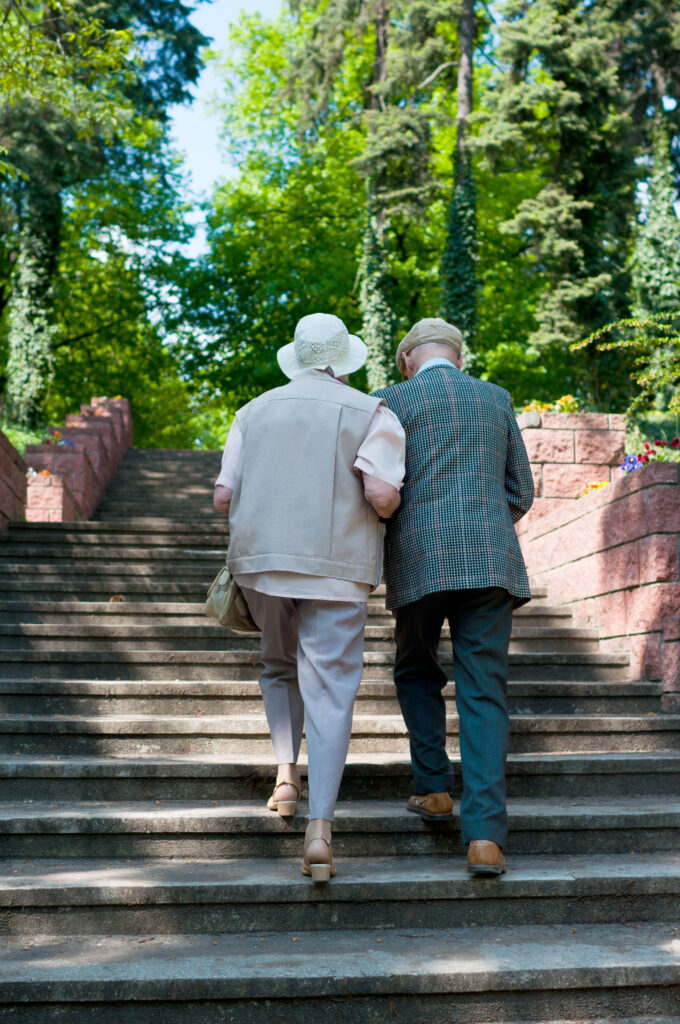
9 Tips for Healthy Aging
Lessons for Living Longer and Better
What is it that keeps some people healthy and active well into their nineties—and even further? Research shows that genetics play a relatively small role in longevity, while things like diet, lifestyle, and environment represent a much larger factor. And it isn’t just the length of life that’s affected by those choices, either—it’s the quality of life. By eating well, moving more, and staying connected, we can all reduce the risks of memory loss and other forms of cognitive decline.
At the Masonic Homes of California, that kind of holistic approach to health has been integrated into just about every facet of campus life, from resident services and activities to the food they eat. Here, Christina Drislane, the director of memory care and connected living at the Masonic Homes, explains the nine elements that make up the “Blue Zone” lifestyle—habits practiced by communities where people live the longest and stay the healthiest, as coined by Dan Buettner, author of The Blue Zones: Lessons for Living Longer from the People Who’ve Lived the Longest.
- Move Naturally
Exercise is great, but just moving your body is important, too. That means taking the stairs instead of the elevator, walking a few blocks to the store instead of driving, or otherwise going out of your way to get active. “It’s about inconveniencing yourself to put movement into your day,” Drislane says.
- Purpose
People who are able to connect to a higher calling consistently report better overall health and longevity. “It’s about asking, ‘Why am I here?’” Drislane says. “You have to make your own mission statement.” Living with purpose gives each day meaning and buoys your spirits.
- Downshift
Whether it’s through prayer, meditation, or happy hour, relieving stress is an important factor in overall health.
- The 80 Percent Rule
Stop eating when you’re 80 percent full—that’s often the difference between maintaining (or losing) weight and gaining it. It also helps prevent things like indigestion and makes keeping track of your calories easier to manage.
- Plant-based Diet
Increasing the plant portion of your diet, while minimizing meat and processed food, is one of the most important parts of developing a healthy diet. Beans play an enormous role in communities with large numbers of centenarians. “Focusing on beans, whole grains, and garden veggies helps lower cholesterol, which is good for your heart, and has been shown to be linked to a reduced risk of memory loss,” Drislane says. “The healthier our bodies are, the less likely it is that we develop memory problems.”
- A Glass of Wine
Moderate alcohol consumption (one or two glasses per day) is actually shown to be strongly linked with overall health, better even than that of non-drinkers.
- Belong
Whether it’s a church group or another kind of community, a huge proportion of the world’s longest-lived people have a group or a place that connects them to others and to something larger than themselves. “It’s about having ritual, having a sense of community,” Drislane says.
- Family Connection
Putting family first is a hallmark of the world’s healthiest aging communities—not just for the elderly, but also for children and adults. Making time to stay in close contact with our families does wonders for our psychological health and happiness.
- Right Tribe
Having a social circle, whether chosen or born into, is good not only for your mental and spiritual health, but even your physiological health. A group of friends that encourages you toward healthy lifestyle choices is one of the most powerful tools you have for living well.While each of the elements is important in its own right, Drislane says they shouldn’t be thought of individually. “Integrating and combining these ideas into our lives is what’s important. So have a glass of wine at 5 p.m. with your friends while taking a walk,” she jokes.
